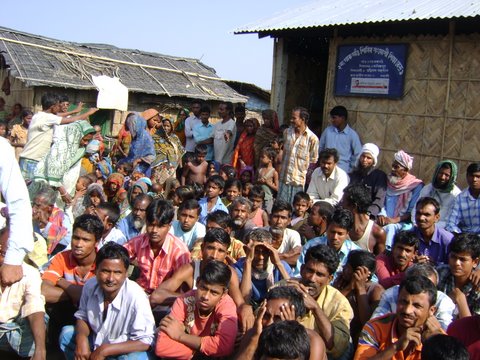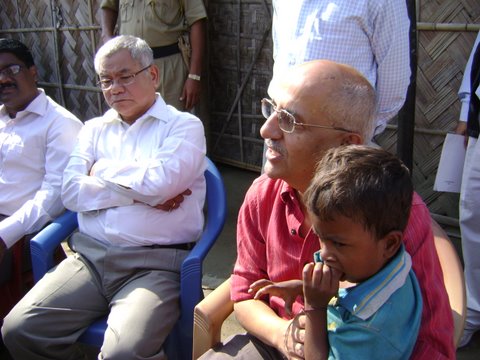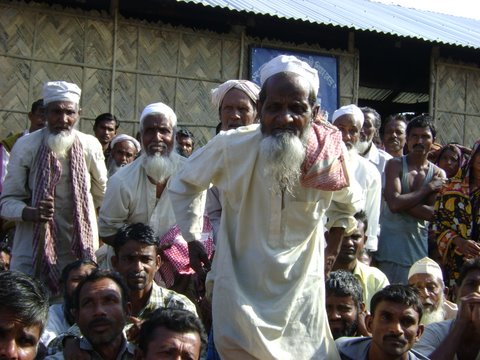By Anju Azad, TwoCircles.net
15 years of life in ‘relief camps’ is probably the longest period for a community to ‘live in transit but without a return ticket’. One of the longest ‘lives in transit’ is also probably one of the least known stories. This is evident through narrated ordeals of the Muslim inmates in Hapasara relief camp situated in Bongaigaon district of Assam, India. The narrations are glimpse of nightmares faced by the inmates of Hapasara camp.
Setting of the camp:
Inmates of this camp are on the move since 1993. Initially they were accommodated in relief camps in Kokrajhar and Chirang districts. Inmates informed that they were living in different villages of these districts bordering Bhutan until one day in 1993, Bodo militants attacked them. Their houses were burnt down and they run away for lives. In this way farmers became landless, houseless and now inmates of this relief camp.
Government promised rehabilitation. Temporary relief camps were settled as informed by the inmates. In 2000, security arrangements were withdrawn from relief camps and food supply was stopped. Fear and security concerns forced the inmates to move again. Ultimately they set up their own camp in Hapasara.

The land of the present camp measures 16 Bighas or 5 acres and is shared by 1350 families. The land is on lease and inmates have to pay a rent of about 26 thousand rupees a year to the owner, Rastam Ali. Govt didn’t provide permanent settlement. Inmates said, ‘we were in government camps in Kokrajhar and Chirang districts for 7 years bordering Bhutan. Community organized the present camp as government did not provide permanent settlement for us. People left the earlier camp because food, relief supply and security outposts were withdrawn.
Situation was so bad for these inmates in the earlier camp that they could not even come out in search of work. Most of the inmates were daily wage earners.
Food security:
In this camp ration for 10 days a month is given per family for last one year. Inmates have no ration cards. They had ration cards before 1993. Huts in the camp were made by the inmates themselves without any assistance from government. There are 1350 families. Government report says that there are 654 households in this camp and in Kokrajhar camp the number of families was 659. The increase in the number of families is due to marriage and separations within families. In the Kokrajhar camp, the official reports say that there were 1122 families.

Harsh Mander, Special Commissioner of Supreme Court on Right to Food
talking to the camp residents, on November 24, 2008
Education:
The nearest primary school from the relief camp is 1.5 km away. Local population resists the admission of the children from camps. Officials informed that seat capacities of these schools are limited and local people are afraid of over crowding. The mid-day meal supply will not be enough if children of the camp are admitted. No survey of the school children in the camp ever took place. Officials informed that 225 students were enrolled in the last survey carried out in the camp. Officials also informed that they are trying to mainstream the camp inmates but failed due to resistance from local population. Hence only a few could get admission in the schools outside the camp.

Primary school in the camp was opened in October 2008.
Employment:
Job cards have been distributed. In Assam Rs 77/day is the minimum wage for manual labour. BDO of Hapasara area informed that the process of registering for job cards has just started and once it is finalized, work will be provided to the inmates.
In their own words:
Majibur Rehman:

I came from Patabarigaon of Kokrajhar and owned lands measuring 13 bighas non-patta land. In 1993, ‘they’ came at night and burnt down our houses. We could save nothing. We took shelter in Bengtal relief camp of Bonggaigaon district. I have nine family members including 4 daughters. I am living in this camp since 2000.
One school has been opened here a year ago. No mid-day meal is given here and Anganwadi is opened only in the last week and baby foods started being distributed for last 4 days only. (Anganwadi workers clarified that their proposal for opening an Anganwadi was accepted only recently).According to Supreme Court there should be one Anganwadi for every 40 children.
Arfan Ali

Born before India’s independence does not want to die in a relief camp.
Arfan Ali, 80 years old inmate of the camp informed that there is no provision for old age pension or widow pension in the camp. There are about 250 widows in the camp.
Towards a permanent solution:
People of the camp don’t want to live in camps any more. One generation has grown up in these camps. Inmates informed that they are given only assurances and no concrete action.
They are demanding Rs. 2 lakh for each family from government. Another proposal was that government has lots of lands in nearby areas, especially forest areas. But reserved forest areas cannot be given to the inmates. The inmates should be given lands from there to settle permanently. Officials informed that the inmates were offered lands in small parcels which the inmates did not agree on security concerns.
One co-operative council headed by the Chief Minster has been established to look for a permanent settlement of the inmates.
[Photos by Anju Azad]
Link:
TCN special series “Muslims in Assam”:
http://www.twocircles.net/special_reports/muslims_under_siege_assam.html

